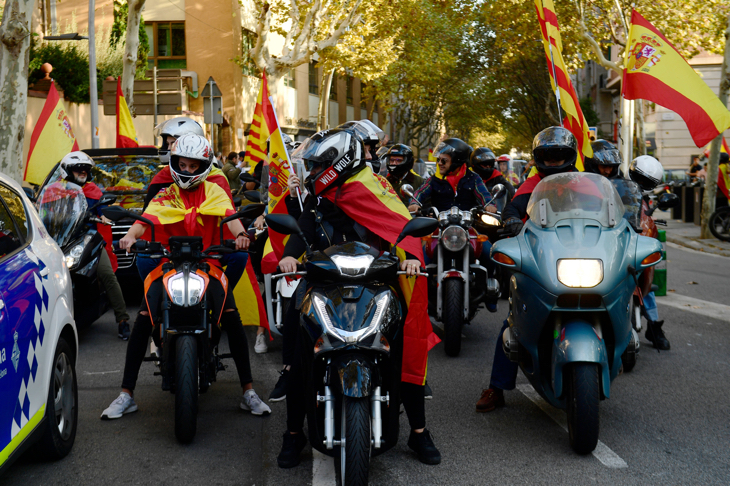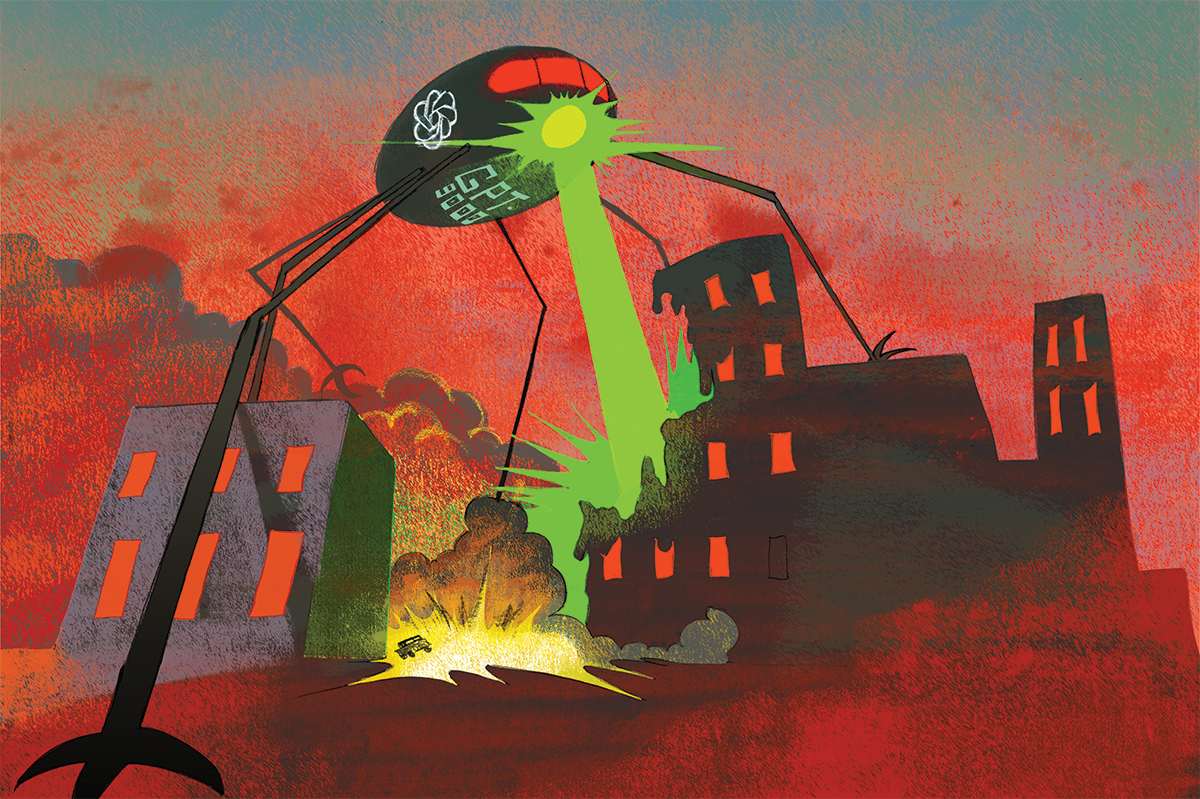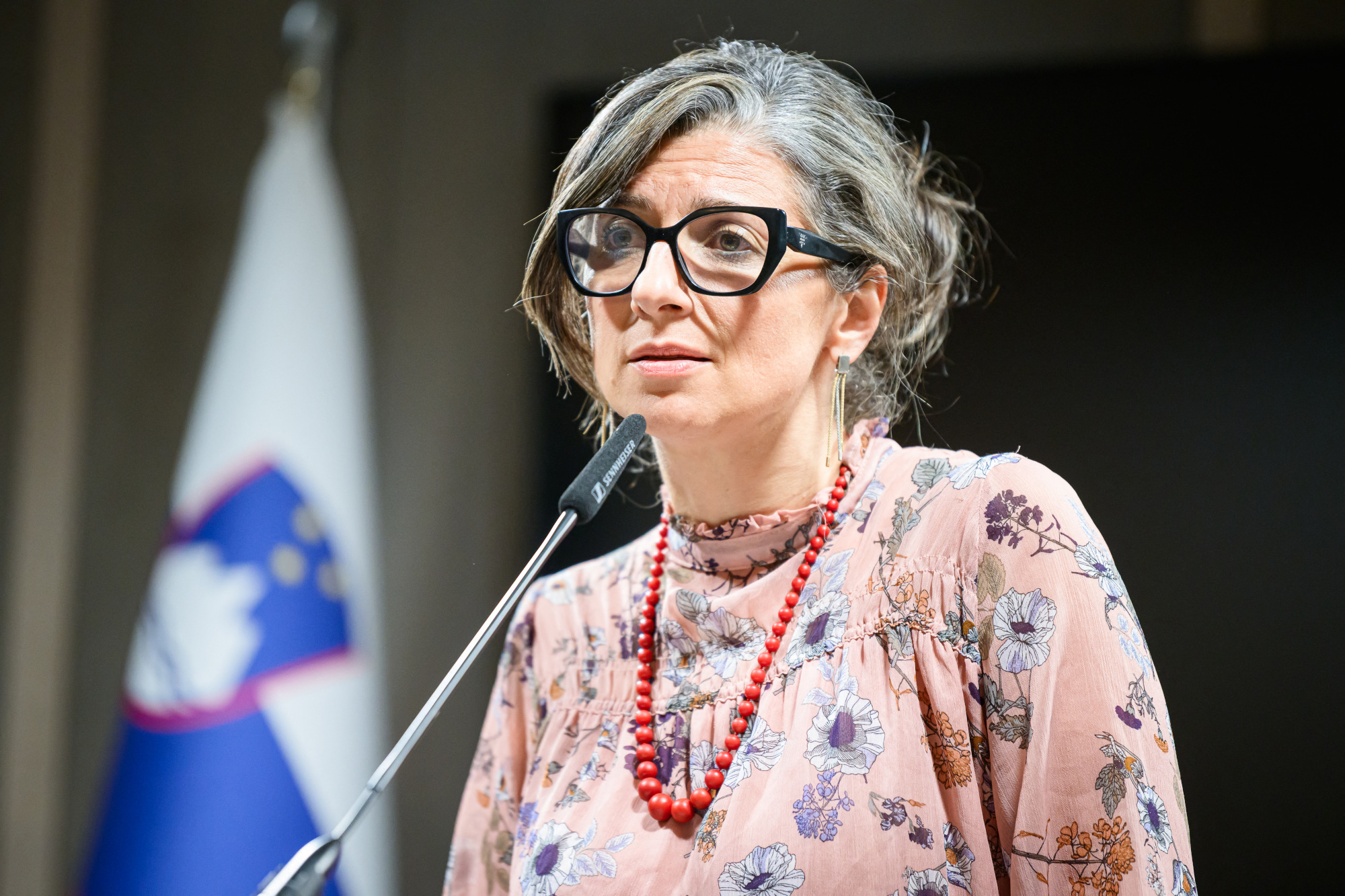After the demonstration in Barcelona on Sunday, I happened to walk past the city’s main police station. A unionist crowd had gathered to praise the officers who had so brutally suppressed the Catalan referendum the previous week. Wrapped in Spanish flags, they were chanting Viva España and throwing flowers. Then they started performing the Nazi salute.
I hung around to report on it (a video that I shot on my phone was retweeted many thousands of times). The fascists, I realised, had based themselves in a pub next door. I went in, filming on my GoPro, and saw police drinking with far-Right thugs, smiling as they were serenaded with Sieg Heils.
I just filmed these guys doing Nazi salutes outside Barcelona police station to praise last week’s brutal riot cops pic.twitter.com/pIS6pQdLu1
— Jake Wallis Simons (@JakeWSimons) October 8, 2017
Later, a masked activist tried to burn a Catalan flag. This time, however, a skinhead spotted me filming and I almost had my head kicked in (as another journalist had earlier that day). Again, no intervention from the cops.
Far-right activists hand-in-glove with police: it’s hard to think of a clearer illustration of the rude health of fascism in modern Spain. For this was not just a one-off. In recent decades, Francoism has been viewed with a blind eye by the Spanish state, which has harnessed it for political advantage.
Understanding this begins with Franco’s deathbed. One peaceful night in November 1975, at the age of 82, El Generalísimo breathed his last. He had presided over concentration camps, ordered the murder of hundreds of thousands of his countrymen, installed a regime of state terror and brainwashing, ordered the mass kidnap of the children of his opponents, yet he had clinched a natural death as a free man. Worse than that: the levers of power were still tight in his pale and cooling fist.
It is true that by the Seventies, the regime was declining and had begun to be seen as outdated. But not for Franco the cyanide capsule in the Berlin bunker. Not for him the summary execution outside the Villa Belmonte. The Germans and Italians learned the hard way that fascism ends in humiliation, but the Spanish strongman was never beaten. Consequently, although Spain soon transitioned to democracy, a reckoning with its fascist past never followed.
Such a reckoning has been dodged ever since by Madrid, for the sake of political expediency. Parliamentary attempts to retrospectively delegitimise the Franco years have been blocked by the ruling Partido Popular (PP). As a result, although not praised in schools, Francoism remains in the official annals of the national story.
In 2007, the Law of Historical Memory – an attempt to formally acknowledge Franco’s victims and limit public adulation of him – was passed by the then-Socialist government. But its impact was limited. It did not, for example, stop the former minister and MEP Jaime Mayor Oreja from describing Spain’s fascist experiment as ‘an extraordinarily peaceful period’.
His nostalgia was not unusual. Franco brought death and repression, but also stability and rising living standards. When seen from the economic doldrums that Spain finds itself in today, some harbour the unarticulated belief that the fascist years were the golden ones.
Even today, symbols of dictatorship are still intact. Churches still display the yoke and arrows, Spain’s answer to the swastika. Streets remain named after Franco’s henchmen, and few visitors could forget the monstrous, 500 foot cross that marks El Caudillo’s resting place.
As in architecture, so in parliament. Spain’s political DNA includes potent strains of fascism. The original incarnation of the PP, the Alianza Popular, was founded by one of Franco’s former ministers. Unsurprising, perhaps, that it has been so reluctant to condemn both the dictator and nationalist street violence.
A vivid example of this came on Monday, when anti-Catalonia thugs rampaged through Valencia, beating up passers by and performing the Nazi salute in massed ranks. One nationalist pensioner threw a cup of hot tea in a journalist’s face. When the dust settled, the only party to fail to condemn the violence was – you guessed it – the PP, which is in charge of the country.
Last year, when a journalist asked Mariano Rajoy, Spain’s Prime Minister, whether it was ‘reasonable that thousands of Spanish citizens still don’t know where their grandfathers are buried,’ he replied: ‘I’m not sure that what you’re saying is true, nor that the government could do anything about it.’ In this, Rajoy was echoing the sentiments of former prime minister José María Aznar, who famously said, ‘let us not disturb their graves or throw their bones over our heads.’
Which brings us to Catalonia, where the political exploitation of Spain’s history is most vivid, and where many bones lie buried.
Under Franco, Catalan language and culture were banned, and aspirations of independence repressed. Franco maintained this stance up until his death. Just eight months before the dictator shuffled off his mortal coil, a young Catalan revolutionary anarchist, Salvador Puig Antich, had his coil shuffled off for him by a State executioner armed with a garrotte. The killing took place at the notorious La Model prison, which was located about a mile from where those thugs were Sieg Heiling on Sunday.
Rajoy has no more desire to see Catalonia break away than had Franco. Not only would it risk depriving Spain of a fifth of its economic output and a quarter of its exports, but secession would seriously undermine the country’s identity – and the government’s authority.
If push came to shove, Madrid has vowed to impose direct rule on Catalonia. If this came to pass, the full winds of popular nationalism would be needed in Rajoy’s sails. Thus, the government’s recent rhetoric has conjured Spain’s bold, fascist past.
Extraordinarily, on Monday, the PP’s spokesman, Pablo Casado, warned that if the Catalonian president dared to declare independence, he could ‘end up like’ Lluís Companys – a Catalonian leader executed by Franco in 1940.
Almost no Madrid official has condemned the police brutality which the world witnessed last week. Spanish loyalists have continually praised the police. Moderate patriots – the overwhelming majority – ascribe the violence to a few bad apples, exaggerated by Catalan propagandists. But the radicals haven’t bothered with the exegesis. After all, there is nothing a fascist relishes more than the sight of a jackbooted policeman beating up a granny with a baton.
Which returns us to the police station in Barcelona. On Sunday night, when the black-clad officers smirked at the Sieg Heil, with Catalan blood fresh on their boots, this was Spain’s Janus-faced politics in microcosm. Fascism has been allowed to flourish in the shadow side of a European liberal democracy. Or to put it another way, Generalissimo Francisco Franco is not dead.
Jake Wallis Simons is Associate Global Editor at the Daily Mail Online

























